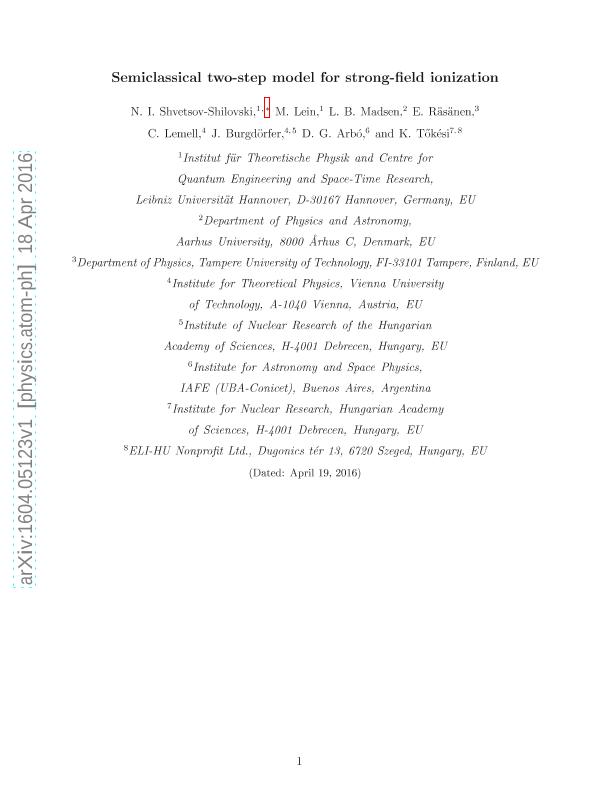Mostrar el registro sencillo del ítem
dc.contributor.author
Shvetsov Shilovski, N. I.
dc.contributor.author
Lein, M.
dc.contributor.author
Madsen, L. B.
dc.contributor.author
Räsänen, E.
dc.contributor.author
Lemell, C.
dc.contributor.author
Burgdörfer, J.
dc.contributor.author
Arbo, Diego

dc.contributor.author
Tokési, K.
dc.date.available
2017-06-16T15:34:36Z
dc.date.issued
2016-07
dc.identifier.citation
Shvetsov Shilovski, N. I.; Lein, M.; Madsen, L. B.; Räsänen, E.; Lemell, C.; et al.; Semiclassical two-step model for strong-field ionization; American Physical Society; Physical Review A: Atomic, Molecular And Optical Physics; 94; 1; 7-2016; 1-12; 013415
dc.identifier.issn
1050-2947
dc.identifier.uri
http://hdl.handle.net/11336/18303
dc.description.abstract
We present a semiclassical two-step model for strong-field ionization that accounts for path interferences of tunnel-ionized electrons in the ionic potential beyond perturbation theory. Within the framework of a classical trajectory Monte Carlo representation of the phase-space dynamics, the model employs the semiclassical approximation to the phase of the full quantum propagator in the exit channel. By comparison with the exact numerical solution of the time-dependent Schrödinger equation for strong-field ionization of hydrogen, we show that for suitable choices of the momentum distribution after the first tunneling step, the model yields good quantitative agreement with the full quantum simulation. The two-dimensional photoelectron momentum distributions, the energy spectra, and the angular distributions are found to be in good agreement with the corresponding quantum results. Specifically, the model quantitatively reproduces the fanlike interference patterns in the low-energy part of the two-dimensional momentum distributions, as well as the modulations in the photoelectron angular distributions.
dc.format
application/pdf
dc.language.iso
eng
dc.publisher
American Physical Society

dc.rights
info:eu-repo/semantics/openAccess
dc.rights.uri
https://creativecommons.org/licenses/by-nc-sa/2.5/ar/
dc.subject
Semiclassical
dc.subject
Strong-Field
dc.subject
Ionization
dc.subject.classification
Física Atómica, Molecular y Química

dc.subject.classification
Ciencias Físicas

dc.subject.classification
CIENCIAS NATURALES Y EXACTAS

dc.title
Semiclassical two-step model for strong-field ionization
dc.type
info:eu-repo/semantics/article
dc.type
info:ar-repo/semantics/artículo
dc.type
info:eu-repo/semantics/publishedVersion
dc.date.updated
2017-06-13T14:13:56Z
dc.journal.volume
94
dc.journal.number
1
dc.journal.pagination
1-12; 013415
dc.journal.pais
Estados Unidos

dc.description.fil
Fil: Shvetsov Shilovski, N. I.. Gottfried Wilhelm Leibniz Universitat; Alemania
dc.description.fil
Fil: Lein, M.. Gottfried Wilhelm Leibniz Universitat; Alemania
dc.description.fil
Fil: Madsen, L. B.. University Aarhus; Dinamarca
dc.description.fil
Fil: Räsänen, E.. Tampere University Of Technology; Finlandia
dc.description.fil
Fil: Lemell, C.. Vienna University Of Technology; Austria
dc.description.fil
Fil: Burgdörfer, J.. Vienna University Of Technology; Austria
dc.description.fil
Fil: Arbo, Diego. Consejo Nacional de Investigaciónes Científicas y Técnicas. Oficina de Coordinación Administrativa Ciudad Universitaria. Instituto de Astronomía y Física del Espacio. - Universidad de Buenos Aires. Facultad de Ciencias Exactas y Naturales. Instituto de Astronomía y Física del Espacio; Argentina
dc.description.fil
Fil: Tokési, K.. Hungarian Academy of Sciences; Hungría. Eli-hu Non-profit Ltd.; Hungría
dc.journal.title
Physical Review A: Atomic, Molecular And Optical Physics

dc.relation.alternativeid
info:eu-repo/semantics/altIdentifier/doi/http://dx.doi.org/10.1103/PhysRevA.94.013415
dc.relation.alternativeid
info:eu-repo/semantics/altIdentifier/arxiv/https://arxiv.org/abs/1604.05123
dc.relation.alternativeid
info:eu-repo/semantics/altIdentifier/url/https://journals.aps.org/pra/abstract/10.1103/PhysRevA.94.013415
Archivos asociados
